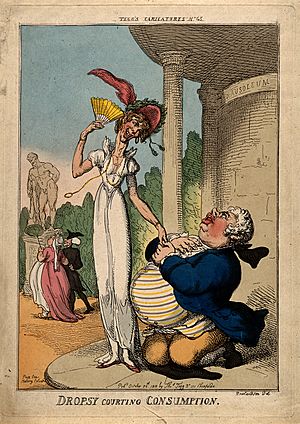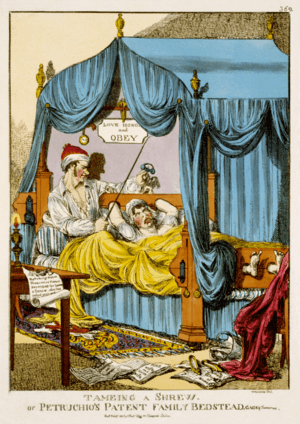Thomas Tegg facts for kids
Thomas Tegg (1776–1845) was a British bookseller and publisher. He became very successful, publishing many popular books and helping to make reading more accessible for people.
Contents
Early Life and Adventures
Thomas Tegg was born in Wimbledon, England, on March 4, 1776. He had a tough start, becoming an orphan when he was only five years old. He went to a boarding school in Scotland.
When he was nine, Thomas became an apprentice to a bookseller named Alexander Meggett. An apprentice learns a trade by working for an expert. But Thomas ran away! He started selling small, inexpensive books called chapbooks in different towns. He traveled a lot, visiting places like Newcastle, where he met a famous wood engraver named Thomas Bewick.
He also worked for a newspaper owner in Sheffield and met interesting people like Thomas Paine. His travels took him to Ireland and Wales before he settled in London in 1796.
Starting a Business in London
When Thomas arrived in London, he worked for a few different booksellers. He learned a lot about the book business. Soon, he decided to start his own company.
He opened a shop with a partner, but he lost money because a friend let him down. To make a fresh start, he got a special license to sell books at auctions in different towns. With his wife helping as a clerk, he traveled around, buying books from private collections. This helped him pay off his debts.
In 1805, Thomas returned to London and opened a shop at 111 Cheapside. He started printing short, simple versions of popular books. These books were a huge hit! He published hundreds of titles, and many sold thousands of copies. By 1840, he had published about 4,000 different books.
Popular Books and Big Projects
One of his first big successes was The Whole Life of Nelson, which he published right after the Battle of Trafalgar in 1805. It sold 50,000 copies! He also published a book about Mary Anne Clarke that sold 13,000 copies.
Thomas Tegg was very good at finding books that people wanted to read. In 1824, he bought the rights to a popular series called Everyday Book and Table Book. He republished it in weekly parts, which made him a lot of money. He even paid another author, William Hone, to write a new book called The Year Book.
As his own books became very popular, he stopped holding auctions. In 1824, he moved his shop to 73 Cheapside. A year later, in 1825, he started publishing a huge set of books called the London Encyclopaedia. This was a massive project with 22 volumes! He also bought many "remainders," which are books that publishers have left over and sell at a lower price. This helped him offer books at affordable prices.
Community Involvement
Thomas Tegg was also involved in his community. In 1835, he was nominated to be an alderman, which is a senior member of a city council. He wasn't elected that time. In 1836, he was chosen to be Sheriff of London. This was an important role, but he chose to pay a fine instead of serving. He added extra money to the fine to create a scholarship for students at the City of London School and donated a collection of books.
Thomas Tegg passed away on April 21, 1845, and was buried in Wimbledon.
Family Legacy
Thomas Tegg had three sons. Two of them, Thomas Tegg and William Tegg, followed in their father's footsteps and continued the family book business. William Tegg (1816–1895) kept the business going for many years after his father's death.
Books by Thomas Tegg
Thomas Tegg wrote or edited several books himself. Here are some of them:
- The Complete Confectioner (a book about making sweets)
- Memoirs of Sir F. Burdett, 1804
- Tegg's Prime Song Book, 1810
- The Rise, Progress, and Termination of the O. P. War at Covent Garden, in Poetic Epistles, 1810
- Chronology, or the Historical Companion: a register of events from the earliest period to the present time, 1811
- Book of Utility or Repository of useful Information, 1822
- Remarks on the Speech of Serjeant Talfourd on the Laws relating to Copyright, 1837
- Handbook for Emigrants, 1839
- Extension of Copyright proposed by Serjeant Talfourd, 1840
- Treasury of Wit and Anecdote, 1842
- A Present to an Apprentice, 1848
He also edited a magazine called The Magazine of Knowledge and Amusement in 1843–4.
 | Bessie Coleman |
 | Spann Watson |
 | Jill E. Brown |
 | Sherman W. White |



